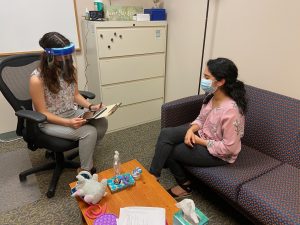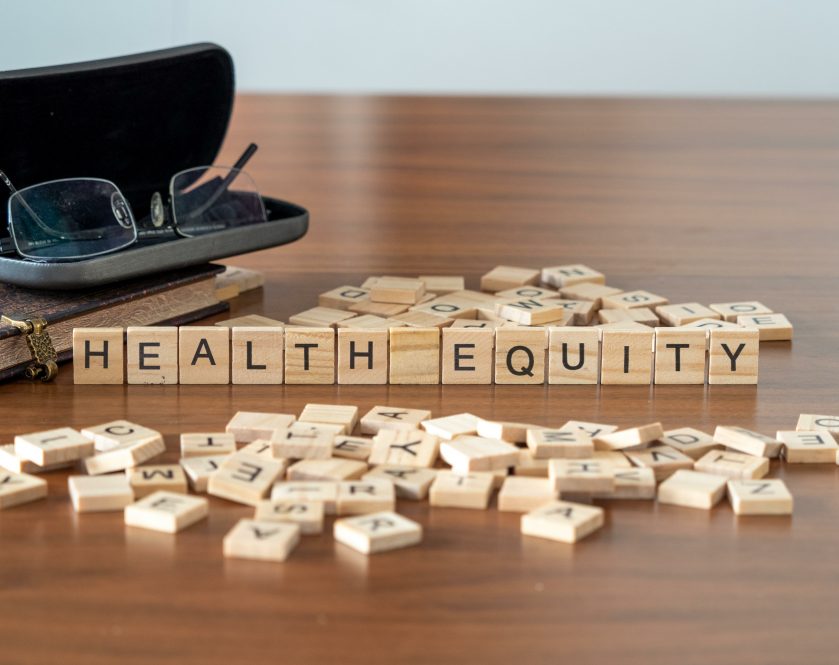Across several UConn Health clinical settings, UConn medical students and other volunteering UConn undergraduates are hard at work uncovering patients’ possible social determinants of health which may lead to increased health risks or health care inequities.

Social determinants of health are a person’s day-to-day environmental factors that may influence his or her health, outcomes and quality of life. Social determinants of health span across economics such as employment status or poverty level, education access or level, health care access, neighborhood, and community issues such as lack of childcare assistance.
Through the new community-based, pre-professional health program called UConn Health Leaders (UCHL), two medical students have program developed and trained more than 100 other volunteering students to conduct screenings of UConn Health patients for any health equity barriers. The trained student volunteers then follow up on any of the revealed health equity barriers by working to address them by advocating on the patient’s behalf and connecting them with necessary social resources they need.
The medical student co-creators of the initiative are Henry L. Siccardi, an M.D./MPH candidate and Jacqueline Steele, an M.D. candidate in the Class of 2022. A few years ago Siccardi had the idea of starting UCHL to help underserved patients by utilizing the time they may spend in the waiting room to help get them any resources they may need.
To conduct the screenings for any social determinants of health the volunteering students, including many UConn undergraduates interested in future health professional careers, have been deployed across five UConn Health outpatient clinics in varying towns, and even virtually earlier on during the COVID-19 pandemic. They use an iPad application called RedCap to confidentially collect patient responses via their social determinants of health survey screening tool.
“Our program was originally supposed to be launched in waiting rooms, but then COVID-19 hit,” says UCHL Co-Founder Steele, 24, of Greenwich. As a result of COVID, the student-led program was initially conducted virtually by phone and in June 2021 resumed in-person surveys of patients in the clinic waiting rooms.
But the positive results of the program’s initial virtual screening activities are already in.
The most common resources patients needed and offered by students were for resource connections for employment, transportation, housing, and prescription or medical costs. In fact, from September to November alone, the program’s volunteers made 12,516 screening calls to patients. Of the calls answered, 1,240 patients consented to screening (19%) with 55% of them screening positive for at least one social determinant of health issue. Of the 435 patients interested in being offered resources by the students 581 resources were connected successfully with 293 patients ultimately accepting (50.4%) the resource assistance.
Students are now volunteering in-person in UConn Health’s clinic locations helping people get better access to the care and resources they need.
“At first we just had 20 volunteering students, and then we grew to over 100 volunteers. And we are receiving a lot of great feedback from the patients we meet,” says Steele. “It takes a few extra minutes to talk about these issues with each patient, but the small amount of time truly makes a great difference.”
Steele adds: “It’s been really rewarding to witness how much students are learning from this experience and also are empowered to see how much you can do to help with someone’s health care. I hope we can keep expanding our program to meet the needs of the community even further.”
“Patients have social issues impacting their well-being and despite the presence of local, state, and federal resources they are often unaware of, or unable to access, that help,” shared Siccardi, UCHL co-founder. “I think UCHL has been successful because it is, at its core, a problem-solving group. We couldn’t have helped patients without a lot of people putting faith in us, and I appreciate their confidence.”
“These two inspiring students developed this program as they saw a need to better address the social inequalities for patients,” says Dr. Christopher Steele, assistant professor of medicine at UConn School of Medicine and the faculty advisor for UCHL who also directs the Health Equity Track for the Internal Medicine Residency Program. “They have done amazing work. Not only have they created a program that addresses health equity barriers, they also found a unique way to get our undergrads directly involved in patient care.”
He says 80 percent of an individual’s health outcomes are actually influenced by one’s social determinants of health.
“We hope our students will enter their career field more eager and prepared to tackle the social determinants of health that affect the health of patients,” adds Steele, the UCHL faculty advisor.
Steele also shared: “UCHL would like to thank all of our coordinators, especially our founding members Ciara Dobrowolski, Katya Skaritanov, Zoha Sarwat and Erin Cova for their hard work and dedication to getting this program started. Both Zoha and Erin are now medical students here and have become crucial leaders in their new roles as medical student leadership in the program. UCHL would also like to thank Khadija Poitras-Rhea and the Population Health team for their continued support and efforts.”



